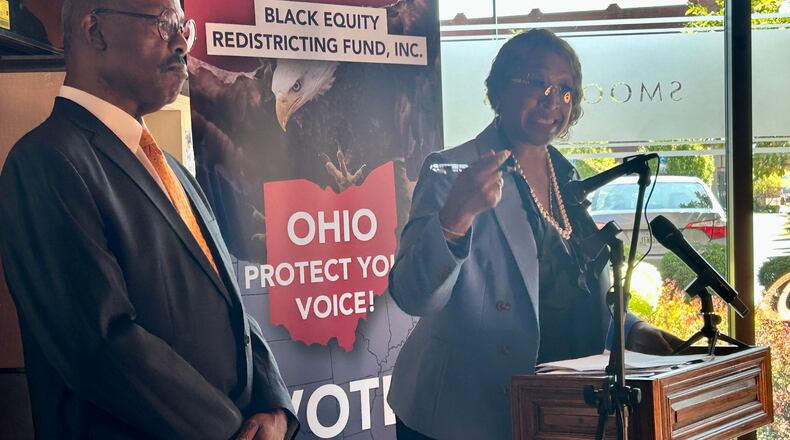Joined by co-founder Sherry Gay-Dagnogo, a Detroit Democrat and former member of the Michigan House of Representatives, the organization took aim at Issue 1 for its language on proportionality, or the idea that the sum of Ohio’s legislative districts ought to reflect the general partisan pattern of voters.
If approved by a simple majority of voters on Nov. 5, Issue 1 would completely scrap the state’s politician-led redistricting system (installed in patchwork fashion by two citizen votes in the past decade) and replace it with a new citizen commission of map drawers consisting of five Democrats, five Republicans and five members not affiliated with either political party.
Issue 1 is backed by current Black Ohio lawmakers and the Ohio NAACP.
In a statement, Ohio NAACP President and former Montgomery County state lawmaker Tom Roberts gave a firm endorsement of Issue 1, arguing that Issue 1 will finally put an end to gerrymandering, which “for generations has harmed Black communities and Black people in Ohio.”
“I have never heard of this ‘Black Equity and Redistricting Fund,’” Roberts said, “but I can tell you Issue 1 is endorsed by every major civil rights organization in Ohio.”
‘Cracking’
Gay-Dagnogo’s primary concern is that, by placing an emphasis on proportionality, Ohio’s proposed system would encourage citizen mapmakers to participate in “cracking,” which is defined by New York University’s Brennan Center for Justice as splitting “groups of people with similar characteristics, such as voters of the same party affiliation, across multiple districts.”
Here’s how that concern might play out in Ohio if Issue 1 is passed.
Issue 1 states that the statewide proportion of districts in Ohio House, Ohio Senate and U.S. Congressional maps “shall correspond closely to the statewide partisan preferences of the voters of Ohio.”
In recent maps adopted and approved by Ohio’s politician-led redistricting panel in 2023, Democrats are technically favored (by varying margins) in only 37 out of 99 Ohio House Districts (37.3%) and 10 out of 33 Ohio Senate Districts (30.3%), despite generally accumulating votes in the mid-40% range on average in statewide elections over the past six years.
One potential way to create more Democratic House districts would be to crack Dayton’s House District 38, a majority Black district that favors Democratic candidates by nearly 55 points, and put more Black voters into one of either House Districts 36 or 39 — which each favor Republicans by six to seven points — in an effort to even the scales.
By spreading the Democratic voters to more districts, map drawers can create a larger number of districts that technically favor Democrats, while also dividing up majority Black communities — undermining the ability of Black candidates to get elected, Gay-Dagnogo argued.
Gay-Dagnogo said she saw this type of cracking happen in Detroit and other urban centers in Michigan after the state’s widely approved citizen redistricting commission went into effect.
She attributed cracking as the reason various Black incumbents lost their reelection bids at the state level and why Black Democratic candidates did not fare well in Michigan’s Congressional elections in 2022, overlooking Michigan Congressman John James, a Black Republican who won a majority white district outside of Detroit in 2022.
“Those three Black congressional seats that you so enjoy here?” said Gay-Dagnogo, referencing Ohio Democratic Congresswomen Joyce Beatty of Columbus, Emilia Sykes of Akron and Shontel Brown of the Cleveland area. “You won’t have them. You won’t have them.”
Local candidates respond
According to the text of Issue 1, legislative maps produced by the group would be required to comply with the federal Voting Rights Act and would have to strive to be as proportional as arithmetically possible, while also:
• Ensuring “the equal functional ability of politically cohesive and geographically proximate racial, ethnic, and language minorities to participate in the political process and to elect candidates of choice,” and;
• Preserving “communities of interest to the extent practicable.”
In her own remarks, Centerville’s Charlotte McGuire, a member of the Ohio Board of Education and a Republican candidate for Dayton’s 6th state Senate District, said she’s opposed to Issue 1 due to fears that Black communities could be split apart in legislative maps for political purposes.
“We talk about community engagement, communities coming together — this could separate us,” said McGuire. She argued that proximate communities that hold similar political views should remain in the same districts “because you’re promoting a social, civic environment where people get along and prosper.”
McGuire is set to face off against Rep. Willis Blackshear, Jr., D-Dayton, this November in a race that underscores the rift in thinking about Issue 1. Blackshear, like many of his Democratic peers in the Ohio Legislative Black Caucus, have come out in favor of Issue 1. He said no one on his side of the aisle has tried to turn him against the proposal.
When this news outlet asked Barnes what sort of inroads his organization has made with current Black legislators in Ohio, he declined to provide specifics.
For more stories like this, sign up for our Ohio Politics newsletter. It’s free, curated, and delivered straight to your inbox every Thursday evening.
Avery Kreemer can be reached at 614-981-1422, on X, via email, or you can drop him a comment/tip with the survey below.
About the Author

